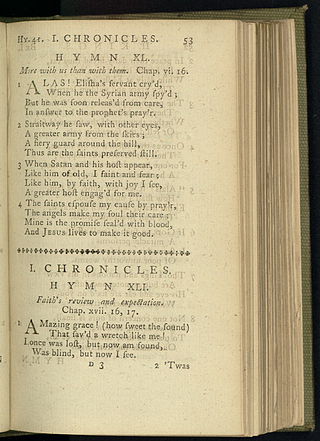
"Amazing Grace" is a Christian hymn published in 1779, written in 1772 by English Anglican clergyman and poet John Newton (1725–1807). It is an immensely popular hymn, particularly in the United States, where it is used for both religious and secular purposes.
Gospel music is a traditional genre of Christian music, and a cornerstone of Christian media. The creation, performance, significance, and even the definition of gospel music varies according to culture and social context. Gospel music is composed and performed for many purposes. Including aesthetic pleasure, religious or ceremonial purposes, and as an entertainment product for the marketplace. Gospel music is characterized by dominant vocals and strong use of harmony with Christian lyrics. Gospel music can be traced to the early 17th century.

"John Brown's Body" is a United States marching song about the abolitionist John Brown. The song was popular in the Union during the American Civil War. The song arose out of the folk hymn tradition of the American camp meeting movement of the late 18th and early 19th century. According to an 1889 account, the original John Brown lyrics were a collective effort by a group of Union soldiers who were referring both to the famous John Brown and also, humorously, to a Sergeant John Brown of their own battalion. Various other authors have published additional verses or claimed credit for originating the John Brown lyrics and tune.
"Joy to the World" is an English Christmas carol. It was written in 1719 by the English minister and hymnwriter Isaac Watts, and its lyrics are a Christian reinterpretation of Psalm 98. The carol is usually sung to an 1848 arrangement by the American composer Lowell Mason.
"The Spirit of God Like a Fire Is Burning" is a hymn of the Latter Day Saint movement. It was written by W. W. Phelps, one of the most prolific hymnwriters of early Latter Day Saint movement.
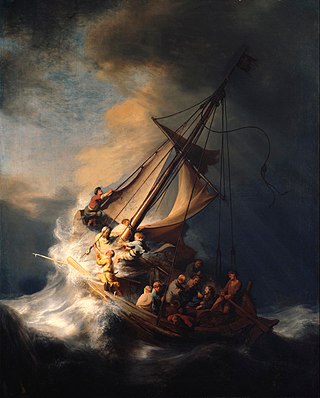
"Eternal Father, Strong to Save" is a British hymn traditionally associated with seafarers, particularly in the maritime armed services. Written in 1860, its author, William Whiting, was inspired by the dangers of the sea described in Psalm 107. It was popularised by the Royal Navy and the United States Navy in the late 19th century, and variations of it were soon adopted by many branches of the armed services in the United Kingdom and the United States. Services who have adapted the hymn include the Royal Marines, Royal Air Force, the British Army, the United States Coast Guard, United States Marine Corps and the United States Space Force, as well as the navies of many Commonwealth realms. Accordingly, it is known by many names, variously referred to as the Hymn of His Majesty's Armed Forces, the Royal Navy Hymn, the United States Navy Hymn, and sometimes by the last line of its first verse, "For Those in Peril on the Sea". The hymn has a long tradition in civilian maritime contexts as well, being regularly invoked by ship's chaplains and sung during services on ocean crossings.

"Jesus Loves Me" is a Christian hymn written by Anna Bartlett Warner (1827–1915). The lyrics first appeared as a poem in the context of an 1860 novel called Say and Seal, written by her older sister Susan Warner (1819–1885), in which the words were spoken as a comforting poem to a dying child. The tune was added in 1862 by William Batchelder Bradbury (1816–1868). Along with his tune, Bradbury added his own chorus "Yes, Jesus loves me, Yes, Jesus Loves me..." After publication as a song it became one of the most popular Christian hymns in churches around the world, especially among children.

"Shall We Gather at the River?" or simply "At the River" are the popular names for the traditional Christian hymn originally titled "Beautiful River" and subsequently titled "Hanson Place," written by American poet and gospel music composer Robert Lowry (1826–1899). It was written in 1864 and is now in the public domain. The title "Hanson Place" is a reference to the original Hanson Place Baptist Church in Brooklyn, where Lowry, as a Baptist minister, sometimes served. The original building now houses a different denomination.
"The Wayfaring Stranger", Roud 3339, is a well-known American folk and gospel song likely originating in the early 19th century about a plaintive soul on the journey through life. As with most folk songs, many variations of the lyrics exist and many versions of this song have been published over time by popular singers, often being linked to times of hardship and notable experiences in the singers' lives, such as the case with Burl Ives' autobiography.

During the American Civil War, music played a prominent role on both sides of the conflict, Union and Confederate. On the battlefield, different instruments including bugles, drums, and fifes were played to issue marching orders or sometimes simply to boost the morale of one's fellow soldiers. Singing was also employed not only as a recreational activity but as a release from the inevitable tensions that come with fighting in a war. In camp, music was a diversion away from the bloodshed, helping the soldiers deal with homesickness and boredom. Soldiers of both sides often engaged in recreation with musical instruments, and when the opposing armies were near each other, sometimes the bands from both sides of the conflict played against each other on the night before a battle.

"Immaculate Mary" or "Immaculate Mother" is a popular Roman Catholic Marian hymn. It is also known as the Lourdes Hymn, a term which also refers to the hymn tune itself. It is often sung in honour of the Immaculate Conception of the Blessed Virgin Mary.
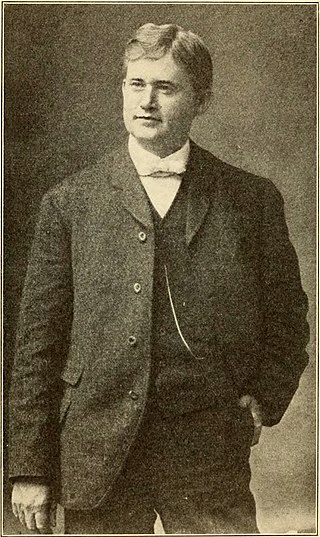
Charles Davis Tillman —also known as Charlie D. Tillman, Charles Tillman, Charlie Tillman, and C. D. Tillman—was a popularizer of the gospel song. He had a knack for adopting material from eclectic sources and flowing it into the mix now known as southern gospel, becoming one of the formative influences on that genre.

"We Plough the Fields and Scatter" is a hymn of German origin commonly associated with harvest festival. Written by poet Matthias Claudius, "Wir pflügen und wir streuen" was published in 1782 and set to music in 1800 attributed to Johann A. P. Schulz. It was translated into English by Jane Montgomery Campbell in 1861. It appears in a shortened form in the musical Godspell, as the song, "All Good Gifts". It is among the most performed of hymns in the United Kingdom.
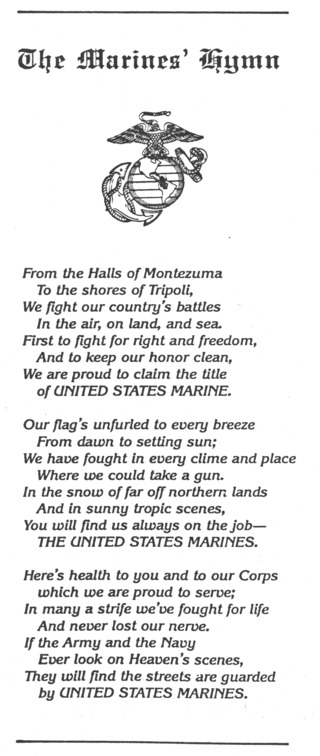
The "Marines' Hymn" is the official hymn of the United States Marine Corps, introduced by the first director of the USMC Band, Francesco Maria Scala. Its music originates from an 1867 work by Jacques Offenbach with the lyrics added by an anonymous author at an unknown time in the following years. Authorized by the Commandant of the Marine Corps in 1929, it is the oldest official song in the United States Armed Forces. The "Marines' Hymn" is typically sung at the position of attention as a gesture of respect. However, the third verse is also used as a toast during formal events, such as the birthday ball and other ceremonies.
When the Roll Is Called Up Yonder is an 1893 hymn with words and music by James Milton Black. It is one of the most popular Christian hymns of all time. The song was inspired by the idea of The Book of Life mentioned in the Bible, and by the absence of a child in Black's Sunday school class when the attendance was taken. The idea of someone's being not in attendance in heaven haunted Black, and after visiting the child's home and calling on a doctor to attend her for pneumonia, he went home and wrote the song after not finding one on a similar topic in his hymn collection. The song's lyrics were first published in a collection titled Songs of the Soul and the song has since been translated into at least 14 languages and sung all over the world in a variety of Christian denominations. There are more than 500 versions available on such sites as Amazon, recorded by various artists such as Loretta Lynn, Johnny Cash, Jim Nabors, and Willie Nelson, to the traditional tune. The lyrics have also been set to new music by contemporary gospel artists such as Doris Johnson. In 1945, British Prime Minister Winston Churchill created a stir in the British press when he quoted the hymn in response to a question about when the Big Three were going to meet; stated the Winnipeg Free Press: "Mr. Churchill, in one of his somewhat puckish moods, replied that he did not know, but, he added irreverently, 'When the roll is called up yonder, I'll be there.'" The British press expressed surprise at Churchill, an Anglican, being familiar with a hymn more associated with Methodism, Presbyterianism, and other "chapel" denominations or the revival meetings of Dwight L. Moody and Ira D. Sankey or R. A. Torrey and Charles McCallon Alexander, whereas the Free Press speculated that Churchill might well have heard the "catchy" tune in the street meetings held by the Salvation Army. He might also have remembered the lyrics from the 1941 movie Sergeant York.
"Willie Has Gone To War" is a song written by Stephen Collins Foster sometime in 1862. It was considered a 'Civil War Song', though it was not as popular as some of his previous work. George Cooper wrote the lyrics. He may have composed up to 285 songs, hymns, arrangements and instrumental works during his lifetime. He also created many of the lyrics.
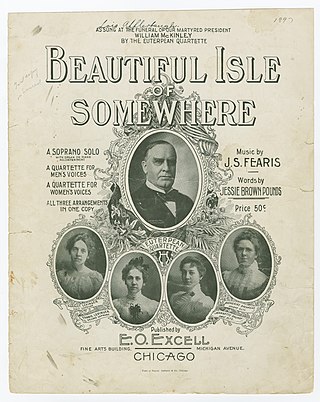
"Beautiful Isle of Somewhere" is a song with words by Jessie Brown Pounds and music by John Sylvester Fearis, written in 1897. The song gained huge popularity when it was used in William McKinley's funeral. It was subsequently a staple at funerals for decades, and there are dozens of recorded versions.

"There is a green hill far away" is a Christian hymn, originally written as a children's hymn but now usually sung for Passiontide. The words are by Cecil Frances Alexander, and the most popular tune by William Horsley.

"Hymn of Heaven" is a song by American contemporary Christian musician Phil Wickham. The song was released on February 11, 2022, as the third single from Wickham's eighth studio album, Hymn of Heaven (2021). Wickham co-wrote the song with Bill Johnson, Brian Johnson, and Chris Davenport. Jonathan Smith produced the single.

Eliza Edmunds Hewitt, also known as Eliza Jane Hewitt, was an American hymn writer, teacher and Presbyterian. She was the author of numerous Christian religious songs. In the beginning, she was active in Olivet Presbyterian Church in Philadelphia. Later she joined the Calvin Presbyterian Church, where she taught the primary class in Sunday school until her death.












